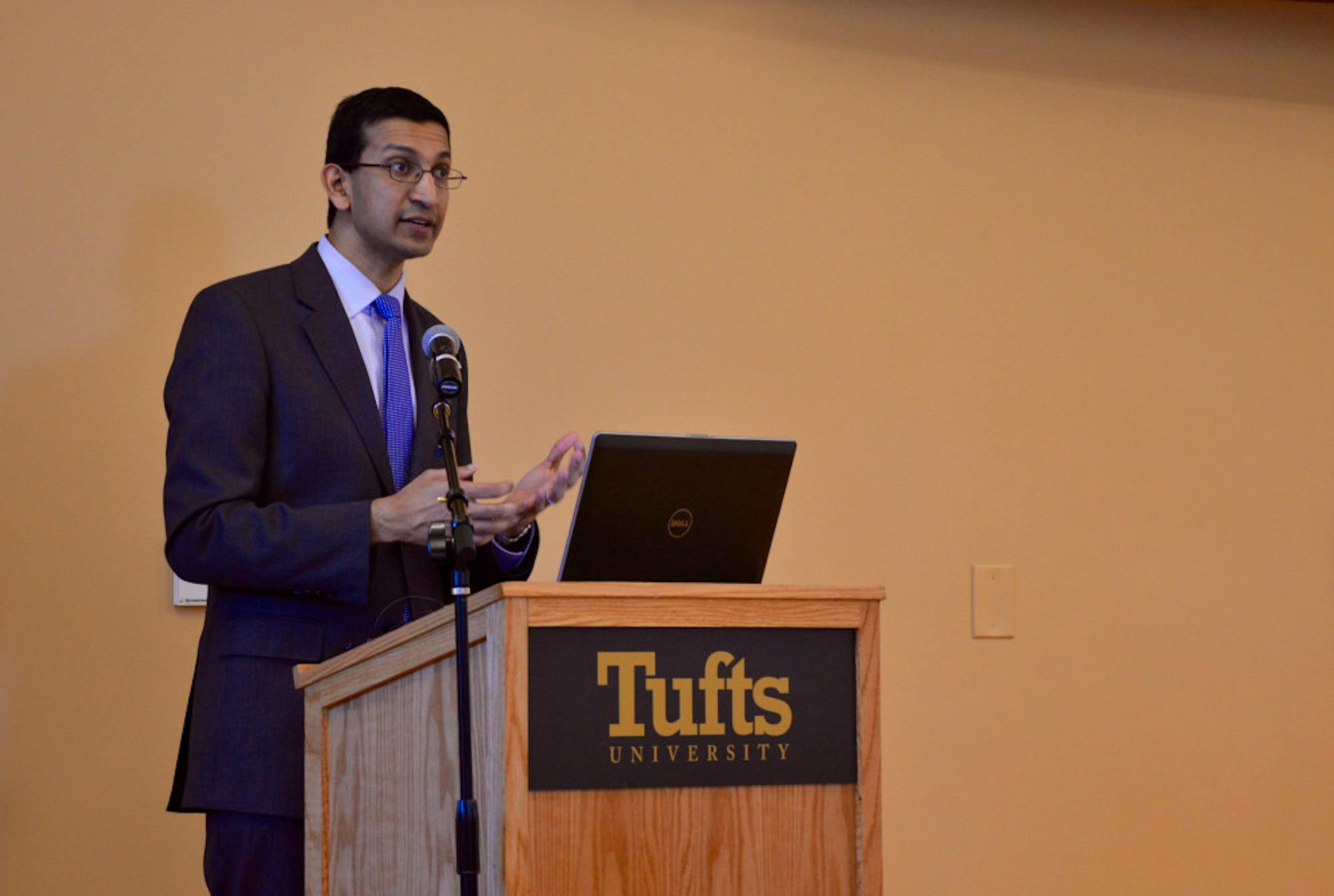Economist Dr. Raj Chetty spoke at this year's Wellington Burham Lecture about equality of opportunity in America at 51 Winthrop St. on Oct. 15. The lecture, titled "Improving Equality of Opportunity in America: New Evidence and Policy Lessons," was sponsored by the Tufts Department of Economics.
Chetty, who is currently an economics professor at Stanford University, completed his Ph.D at the age of 23 and went on become one of the youngest tenured professors in the history of Harvard University, according to his website. He is also a MacArthur Fellow and a recipient of the American Economic Association’s John Bates Clark Medal for best American economist under the age of 40.
The turnout filled more than half the venue. Both undergraduate and graduate students were in attendance, including sophomore Jamie Fonarev and economics graduate student Yiwei Jiang, who both said they attended the event because they were interested in works that they had read by Chetty in their classes.
Dr. Jeffrey Zabel began the lecture with introductory remarks that described the importance of Chetty’s research.
“There are too many of us academics that are happy enough to write highly technical research papers, myself included, that have no real influence on policy and the real world,” Zabel said. “[Chetty] addresses head-on some of the most important policy issues today.”
Chetty’s lecture focused on one’s ability to achieve the “American Dream." He explained that upward mobility is much lower in America than in other developed nations.
“Your chances of achieving the American dream are almost two times higher growing up in Canada than in the United States,” he said.
In trying to explain this phenomena, Chetty said that he and his colleagues examined the state of social mobility in different places across America. They found that the chances of improving one's economic status varied widely across the country -- even from county to county.
Chetty said that he looked at families moving from areas of low social mobility to areas of high social mobility to ascertain the impact on children’s lives. He found that the more time one spends growing up in areas of high social mobility, the greater the chances are of climbing up the economic ladder.
“Every extra year that you spend growing up in a better environment, you improve your outcomes. If you get there too late, you don’t see any upward gain at all,” Chetty said.
In one striking example, he discussed the U.S. Department of Housing and Urban Development's (HUD) "Moving to Opportunity" (MTO) housing mobility research. In one subset of these experiments, families living in low-mobility public housing projects in Harlem were given vouchers to live in high-mobility areas of the Bronx.
“We find that they are earning 30 percent more if they grew up in the Bronx instead of Harlem. That’s a $100,000 gain in earnings over their lifetime,” Chetty said. “They’re 27 percent more likely to attend college. They’re 30 percent less likely to become single parents.”
Chetty suggested that policymakers could use this data to help move people living in low mobility areas to places with greater social mobility. However, he acknowledged that the cost and scale of this solution make it unfeasible. He said a better solution would be to find out what high-mobility areas are doing well so that other areas can adopt these characteristics.
Chetty discussed several factors that he and other sociologists and economists have found to be correlated with more social mobility, including less racial and income segregation, reduced urban sprawl, less income inequality and more social capital. Another important factor is the number of single-parent households in a community, he said.
“We find a very strong correlation between the fraction of single parents in an area and rates of upward mobility, even for kids whose own parents are married,” Chetty said.
Chetty also explained the impact of high quality schools on social mobility, citing research that showed replacing an ineffective teacher with a highly effective one had major impacts on students' outcomes later in life.
“That single change in a single school year would increase the life-time earnings of the average child in the U.S. by about $50,000,” he said. “That translates to an undiscounted sum of $1.4 million per classroom of 28 students.”
He added that there is a relationship between an individual's likelihood to innovate and their parents' income, as measured by receiving a patent.
“In the U.S., in order to become an inventor, you need two things: you need to be smart, and you need to have rich parents,” he said.
Chetty argued that all of society would benefit if poor and middle-class children had more opportunities to become innovators.
“If those kids end up discovering the next important drug or inventing the next iPhone, that’s obviously going to benefit everyone,” Chetty said.
Chetty encouraged the audience not only to see the case for greater equality of opportunity from a social justice perspective, but also from the lens of pragmatic economics.
“Improving opportunities can also increase the size of the economic pie,” he said.
At the end of the lecture, there was a question and answer session during which a range of subjects were addressed, including how Chetty's findings related to tax policy reform, pre-kindergarten education and technological changes.
Stanford economics professor speaks at annual Wellington Burham Lecture

Raj Chetty, a professor of economics at Stanford University, presented a lecture called "Improving Equality of Opportunity in America: New Evidence and Policy Lessons" on Oct. 15.





